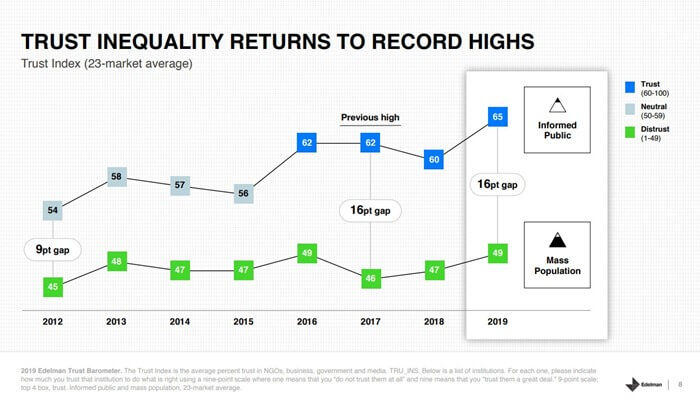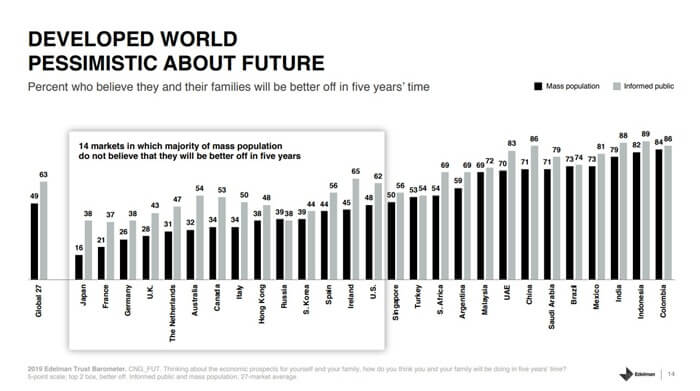Who do people trust in an era of unprecedented mistrust of authority and skepticism of information in the media? It is this aspect of society that is being explored by the independent firm Edelman. For almost 20 years she has been compiling the Trust Barometer - a barometer of trust in various public institutions.
Methodology for compiling a rating of public trust
The trust barometer was compiled through an online survey of 1,150 respondents from each of the 27 countries around the world.
This year's survey focused on the relationship between employer and employee, so 55% of the total population worldwide were full-time or part-time workers.
I don't trust anyone except the employer
The latest 2019 Edelman Trust Barometer survey shows that people's trust has shifted to relationships that can be more or less controlled, especially the employee-employer relationship.
Globally, “their employer” is significantly more trusted (75 percent) than public organizations (57 percent), business (56 percent), government (48 percent) and the media (47 percent).
 David Bersoff
David Bersoff
Research Director, Edelman Trust Barometer
“When you are in an alarming situation, or have lost faith in the system, or you have a desire to change, but there is no way to achieve this, then the relationship between employer and employee is an island in a storm. This is the only trusting, personal and local relationship that employees think they can influence, and it’s a relationship with an organization where they can do something. ”
This shift to localized trust unfolds against the backdrop of the largest gap in trust in the history of the Edelman Trust Barometer between the informed public (65 percent) and the general population (49 percent). The compilers of the rating understand the informed stratum as educated people who follow the current news.
The division is due to record levels of trust among the informed public in developed markets, while public confidence remains relatively low.
The highest confidence gap is in developed countries
- Great Britain - 24 points;
- Canada - 20 points;
- France - 18 points;
- USA - 13 points.
However, he did not bypass the actively developing countries of the developing world:
- India - 17 points;
- China - 12 points.
The difference in trust is noticeable between men and women in different countries. For example, skepticism about whether institutions can be trusted to “do what's right,” as Edelman puts it, is noticeably more pronounced among women across the board.
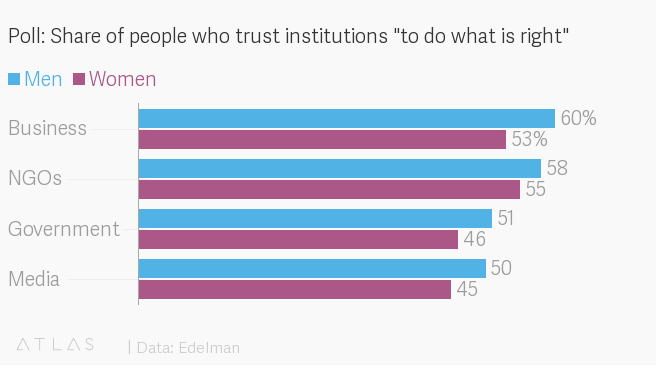
This is a frightening future
There is a growing sense of pessimism about the future in the developed world, and only one in three Edelman respondents believes his or her family will be better off in the next five years. Only one in five believes that the system works for him, and 70 percent want change.
People are scared by the possibility of losing their jobs and too high rates of innovation.
These fears sparked a drive for change and triggered an unprecedented increase in media consumption and the exchange of news and information.
Trust in traditional media (65 percent) and search engines (65 percent) is currently at its highest historical level, driven by significant growth in developed markets. But people have less trust in social networks (43 percent).
Trust in public institutions in Russia
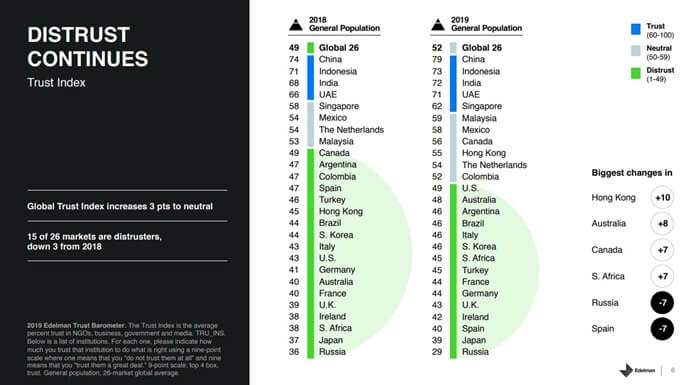
Russians trust public institutions least of all in the world. And if the global index of confidence in the world grew by three points (from 49 to 45) compared to 2018, then in Russia the level of trust in the authorities, the press, NGOs and business fell by 7 points, from 36 to 29.
- Business structures are trusted by 34% of Russians.
- Non-governmental organizations - 23%.
- Only 26% of respondents from the Russian Federation have confidence in the media.
- The UN is believed a little more - 32%.
- Only 24% expressed confidence in the European Union.
- The residents of the Russian Federation are also skeptical about their government. Only 34% of respondents believe that the assurances of the current government can be trusted. This is 10 points lower compared to the previous year.
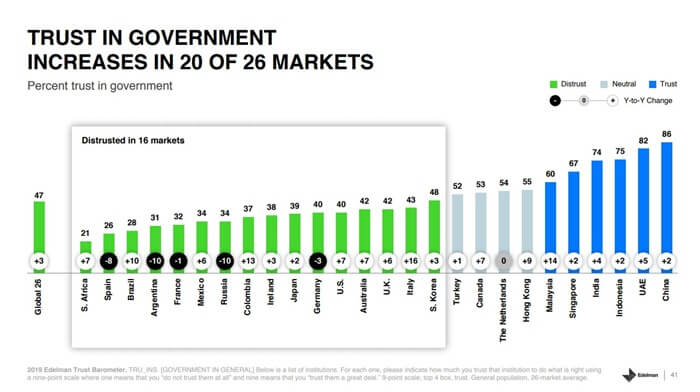
At the same time, 39% of respondents from Russia are confident that in five years their families will live better than at present. However, there are fewer optimists among the informed public - 38%.
But the level of trust in employers, although it decreased from 65% to 63% compared to last year, is still quite high.
General research results
The 2019 study of the level of trust in public institutions proves that, although on a global scale, citizens' trust increased by 3 points (up to 52 points) compared to last year, it is still difficult to talk about significant positive growth.
In 15 out of 26 countries, the level of trust still cannot exceed the 50-point limit. The least confidence is characteristic of Russia, which scored only 29 points. The Japanese (39 points) and the Spanish (40 points) are also not very confident in their government, media, NGOs and business. At the other end of the ranking are China (79), Indonesia (73) and India (72).
The Edelman poll also found that employers working to build trust can expect tangible benefits: workers who trust their employer are more engaged (71 percent), loyal (74 percent), support (78 percent), and commitment (83 percent). ) than employees who are skeptical about their employer.


